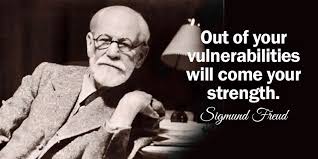
Somewhere in our early lives, we learn that exposing our weaknesses is not a good thing. Along the way, we figure out ways to shield ourselves from that exposure as often as we can. It is in our nature to want to be in control. This holds true in the business world, where we don’t want anyone to know we fear anything.
However, the ability to share imperfections, insecurities and to embrace vulnerability, helps us be our authentic selves. It is what connects us to others and what builds strong, trusting relationships. And it takes courage to do so.
Fran Weissman, CFO at Amscan, Inc. thought that vulnerability was a handicap in the workplace. She thought bringing your A-game to work meant arriving with your poker-face, and showing no emotion. For her, a personal crisis pushed her to show vulnerability. Just as Fran earned her first VP position, her daughter had a health issue and needed heart surgery. Normally, Fran did not share her personal challenges at work, but she knew she had to ask her team for help. She had to lean on them, and it required her to open up.
“What I realized was that when you embrace vulnerability, people like to help. People feel valued and empowered when you ask them to step in for you. I always made work about work. In reality, it’s the person that shows up…that’s what your team wants to see.”
Sarena Lin, President of Cargill Feed and Nutrition, cut her teeth at McKinsey with strategy work. When she started at Cargill in the role of leading corporate strategy and development with a team of 90, she was very comfortable in this role. Two years later, she was tapped by the CEO to lead Cargill Feed and Nutrition; a group covering 200 locations with 15,000 employees. Sarena’s instincts told her she needed to prove herself and show that she was in control.
She quickly learned her previous approach was not going to get her where she needed to go. Fortunately, she had a great boss who reminded her that her role was to lead and empower the team so they can go do their best job. She needed to take time to learn. The more she listened, the more she realized how talented her team was. “I learned the more senior you become, the less you know. It takes courage to tell people, ‘I don’t know this. You might be the best person to answer it. Come and help me learn.’
“I had to have the courage to be confidently vulnerable. Now, with more trust and credibility two years into the role, I’m giving myself a bit more permission to lead from the front.”
In our book, Wisdom Warriors: Women with the courage to be true to themselves, many successful executives tell stories about how sharing vulnerabilities opened up numerous doors that had otherwise been closed.
Embracing your vulnerability is an asset. When you tell people you don’t know, when you let them into your life, you become more human, more approachable. And that asset allows you to move out of the way, and allow your team’s talent to take the lead instead.
The sooner we learn not to fear being exposed, the sooner we can experience the rewards of vulnerability. And as Fran and Sarena learned, allowing themselves to be human created opportunities for their teams to shine and opened the doors for greater trust in their relationships.
Once you embrace vulnerability you can begin to build trust.
When has your vulnerability yielded positive outcomes? Please share your story in the comments below.
